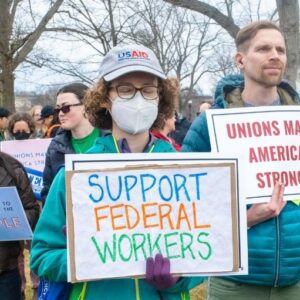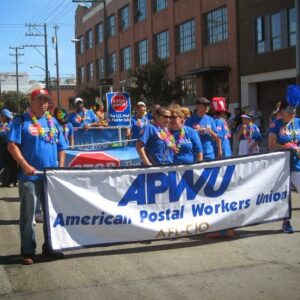April 1, 2019
Solidarity Works! United Worker Actions Mean We Prevail
(This article first appeared in the March/April 2019 issue of the American Postal Worker magazine)
Working people across the country continue to build on past organizing successes to beat back government actions that threaten our jobs and our families’ futures.
For the last few years, labor has been in the streets, defending our rights to good, family-sustaining jobs and dignified retirements. APWU has been a key part of these recent labor victories, with our successful Stop Staples campaign against privatizers in the USPS.
2019 is barely three months old, yet collective worker action has already led to two tremendous victories. First, the partial government shutdown beginning Dec. 22, 2018. More than 800,000 federal workers were locked out or forced to work without pay as President Trump demanded billions in funding for a border wall. After the longest federal government shutdown in history – lasting 35 days – workers brought it to an end because they fought back, and the entire American labor movement came to their aid.
Second, the strike by education personnel in West Virginia – the second in as many years – once again captured national attention and showed the country how it is possible to win when workers stand together, even when the government is set squarely against them.
Labor Stands Together
AFL-CIO Rally to End the Government Shutdown on Jan. 10
When the federal government shutdown began on Dec. 22, it was clear that the White House would not be persuaded to compromise on its demand for more than $5 billion to fund a wall on the southern border. Negotiations early in the shutdown quickly went nowhere, with President Trump threatening to keep the government shut down for “months…or even years,” according to news reports.
800,000 federal workers were locked out of their jobs or working without pay – which should be illegal. As days became weeks, workers missed paychecks. Many – including Transportation Security Administration (TSA) workers, correctional officers, and Internal Revenue Service (IRS) employees – were forced to continue working without pay.
Out of this desperate situation came inspiring resistance and solidarity from union sisters and brothers and community allies across the country. Early in the shutdown, groups organized protests in multiple cities, including Philadelphia, St. Louis, Dallas, and others.
On Jan. 10, union members gathered in front of the AFL-CIO building for a rally organized by the ‘House of Labor.’” APWU members and officers joined furloughed workers, lawmakers, and other allies.
AFL-CIO President Richard Trumka demanded the government immediately re-open or face the fury of workers: “We will not sit down. We will not be silent,” he told the crowd. “We will never stop standing up, fighting, and marching for every single worker!”
American Federation of Government Employees (AFGE) President J. David Cox placed the blame squarely on the White House, and also Senate Majority Leader Mitch McConnell (R-KY). “I’d like to make sure that everyone knows that this effort and extortion is more of a lockout than a shutdown,” Cox said.
On Jan. 23, APWU officers joined with protesters from other unions and community allies in a sit-in at the Hart Senate Office Building. The sit-in included a 33-minute silent protest – one minute for each day of the shutdown – with protesters holding plates in the air to symbolize the desperation of having to go to food banks for groceries in the absence of a paycheck.
Following the silent portion, protesters joined together in chanting “No more food banks, we need paychecks!”
After the protest, community allies were arrested as they sat in front of Sen. McConnell’s (R-KY) office.
“The APWU stood shoulder to shoulder with the 800,000 federal workers locked-out, or forced to work for no pay,” said President Dimondstein. “It is wrong to hold workers’ livelihoods hostage for political grandstanding.”
General Strike Call and the End of the Shutdown
Perhaps no other person came to symbolize labor’s resistance against the shutdown and the remarkable solidarity with fellow workers than Association of Flight Attendants-CWA (AFA-CWA) President Sara Nelson.
Though flight attendants were not themselves furloughed, thousands of air traffic controllers were forced to work for no pay. Additionally, training of new air traffic controllers was suspended, slowing the arrival of new workers and adding immense stress to the country’s aviation system.
On Jan. 10, Nelson and Association of Professional Flight Attendants (APFA) President Lori Bassani released a joint letter to the White House and Congressional Leadership. “End this shutdown,” the letter read. “Do not put flight attendants, other aviation workers, and the traveling public at risk any longer.”
protest the federal government shutdown at the
Federal Hart Building in Washington, D.C. on Jan. 23.
Ten days later, at the AFL-CIO’s annual Martin Luther King Jr. Civil and Human Rights Awards Dinner, Nelson called for a general strike – an idea unheard of in the labor movement for 70 years.
“The country sees no solution in sight, but labor can lead the way,” she said. “Go back with the fierce urgency of now to talk with your locals and international unions about all workers joining together – to end this shutdown with a general strike.”
On Jan. 24. with the government still shut down, Nelson held a press conference at Ronald Reagan Washington National Airport strengthening her strike threat.
The next day, a group of air traffic controllers on the East Coast, having reached a physical breaking-point, called in sick and stayed home from work, grounding flights at New York LaGuardia and Philadelphia International airports.
The AFA put out a news release, which said, “Do we have your attention now, Leader McConnell?” Just hours later, President Trump announced a deal to re-open the government for three weeks.
Nelson kept the threat of a general strike alive in the event of another shutdown, launching generalstrike2019.org.
On Feb. 15, the day before funding expired again, the President signed a full funding bill.
“When labor has power and density, politics will reflect working people. It changes everything,” Nelson told Jacobin in January. “Start in the workplace, and the politics will follow.”
West Virginia Teachers Go Back to the Streets
Wilson (right) with striking West Virginia
education workers at Hurricane High School
in Hurricane, WV on Feb. 19.
Shortly after the federal government shutdown was stopped, teachers and education workers in West Virginia hit the streets for the second time. Nearly a year to the day after their 2018 strike that kicked off a national movement of education worker walkouts, teachers and school support personnel struck to protest against laws introduced as punishment for their 2018 strike, designed to break the education unions in West Virginia.
The bill had worked its way through the West Virginia legislature since January, originating in the State Senate, where the majority leader had been the key target of the 2018 worker protests and the strike. A key point of contention was a Senate-passed amendment that created seven charter schools across the state and provided state funding for parents of special needs children to send their kids to private schools.
Union brothers and sisters fought the bill from its introduction, arguing the state’s lawmakers only listened to private, out-of-state interests, advancing a bill that would have emboldened privatization at the expense of the public education system, all without consulting teachers.
West Virginia State Editor Chris Smith (middle)
supports striking education workers at
Stonewall Jackson Middle School in Charleston,
WV on Feb. 19.
As the bill moved to the House of Delegates, education workers mobilized quickly. 54 of the state’s 55 county school districts closed on Tuesday, Feb. 19, as educators took to the streets, supported by APWU members and other labor and community allies. The workers refused to stand by as privatizers attempted to raid the coffers of the state’s education system, even though the bill promised them a pay raise.
“Keep the $4,000 [raise] because the soul of West Virginia and our students are worth more than $4,000 a year,” Katie Endicott, a Mingo County teacher, told New York Magazine. “We’re not going to sell them out.”
The legislators remembered what had happened the year before when teachers and school support personnel banded together, and only a few hours after the strike began, the House of Delegates voted 53-45 to kill the bill.
“We are proud to stand by the teachers and school personnel who hit the streets against this bill and pressured lawmakers through their action to do the right thing,” said President Dimondstein after the House of Delegates vote. “It shows that when we stand strong and united, we win.”
This is How We Win
In the last year, postal workers had major challenges surface. On Dec. 4, 2018, the White House Postal Task Force released its report detailing plans to begin the process of privatizing the Postal Service, proposed in the Office of Management and Budget’s (OMB) June recommendations.
We also face a long, challenging fight with the Postal Service in interest arbitration, where management will fight for draconian, regressive proposals.
“Workers can force whichever political wing of corporate power holds the reins to respond to workers’ united action,” said President Dimondstein. “Workers build power when we mobilize and fight for our own destiny.”
Our enemies continue to take aim at our collective bargaining rights, which were fought for and won through collective, militant action and boots on the ground in the 1970 Great Postal Strike. That strike, the Stop Staples victory, and other recent worker successes hold valuable lessons as we continue Fighting Today for a Better Tomorrow.
We must not play it safe and be afraid to take risks. “We will continue to fight against privatization and the infuriating proposals of USPS management, but the fight cannot only be won in Washington, D.C.,” President Dimondstein continued. “APWU members must continue to organize and show our united, collective power. As the last year has shown, when workers stand together, our communities stand with them. When we organize, we win.”
More Strikers in 2018 than in the Last 32 Years
It’s clear that the last year brought a wave of union victories as workers went on strike. A February report from the Bureau of Labor Statistics (BLS) shows just how much a paradigm shift 2018 was in terms of the overall number of striking workers.
The report details 20 major work stoppages across the country in 2018, the most since 2007. These stoppages involved 485,000 workers, the most since 1986 and a massive increase from the 25,000 total involved workers in 2017. With more strikes and other work stoppages across the country in early 2019, the momentum is building as workers show their strength in the face of corporate and political attacks.



